Francesca Lombardo: “I think my style of music has something to do with being a girl”
The Italian-born DJ, producer and instrumentalist on composition, recording and the electronic music gender imbalance

Born in Lombardy’s Castiglione Delle Stiviere region, Francesca Lombardo began writing piano pieces aged six, later following her musical instincts to sing in school operas and bands
Estranged from commercial Italian pop music, her uncle introduced her to the world of electronic music, leading Lombardo towards London in the late ’90s to educate herself on music engineering, production and vocal techniques at various sound and technology schools.
With hardware out of reach, she relied on her burgeoning DJ career as ‘Jackie Misfit’ to kickstart a career in production. Early releases carved a path in underground techno, while her DJ lifestyle blossomed, with globe-trotting appearances at Burning Man, Tomorrowland and Circoloco.
After 20 years of development, Lombardo was finally ready to merge her love of electronic music with her classical past, resulting in debut album Life of Leaf.
What came first, wanting to be a producer or DJ?
“DJing just happened. I moved to London in 1999, ended up going to illegal raves every weekend and suddenly started to DJ. I was already a musician, playing piano and singing, but the will to become a producer arrived when I was shown a studio by my piano teacher when I was 11 or 12 years old. I met a lot of people who helped me and showed my love for production by going to school but didn’t have any money to buy anything. My passion for DJing came a little bit later.”
"Italian electronic pop music copied a lot of English music - it’s always been really cheesy and I didn’t like music sung in that language."
Did your Italian heritage inform your taste when it came to music?
Want all the hottest music and gear news, reviews, deals, features and more, direct to your inbox? Sign up here.
“Actually, when I lived in Italy I was just listening to whatever was on the radio and a lot of psychedelic rock and ’80s music. I liked the classical side of Italian music, but wasn’t into disco back in the day because it was too underground and Italian electronic pop music copied a lot of English music - it’s always been really cheesy and I didn’t like music sung in that language.
“I was always attracted to what people were listening to abroad, especially English music. I was lucky that my uncle had very good taste and introduced me to lots of electronic artists like Mike Oldfield and Kraftwerk.”
What was the first big show you DJed and can you remember that experience?
“I think it was around 2000. I used to buy a lot of vinyl in a record shop in Kentish Town called Access All Areas. Back then I was playing acid and acid techno. The owner asked me if I could play there one Saturday afternoon when it was really busy. Luckily, a promoter came by and asked if I wanted to DJ at a party under the arches at London Bridge where only women DJs were playing. Every arch played a different type of music, from reggae to techno and drum & bass.”
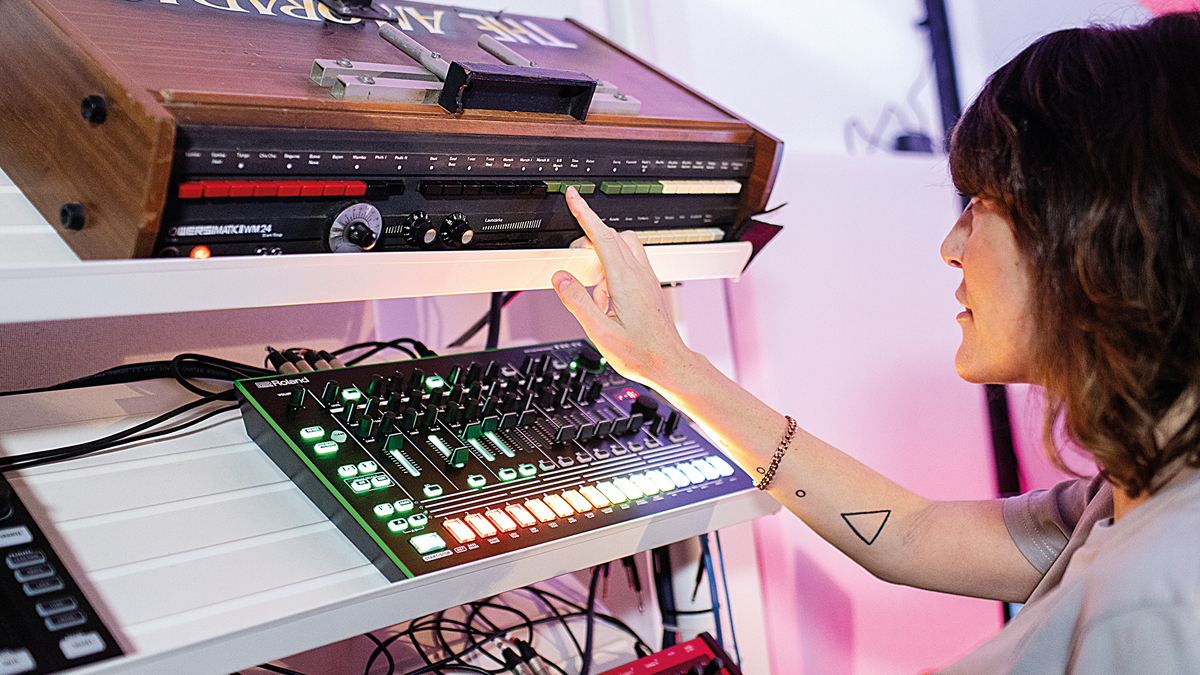
Was that under the name The Misfits?
“Yes, I was playing with another girl who was my neighbour in the room upstairs. The set was only half an hour long but I was too scared to play by myself. We did our first gig as The Misfits, playing for half an hour back to back. We were so excited but nervous. Everything was so pure back in those days - it was just you and your vinyl.”
How long did you last as a DJ duo?
“We played together for a while; she was a bit more funky and I was a bit more acid and hard techno. In the end we created singular names. We would still play together but I became Jackie Misfit.
“Many years later, I was walking around in Hackney and saw the poster for that party still hanging there - I couldn’t believe it! In those days, I didn’t have an agent or a manager - things didn’t work like that. I just started playing at squat parties, Café 1001 in Brick Lane and, later, the East London area.
“That’s when my DJ sound started to change from hard acid techno to a minimal techno style that was a little more melodic. It was around that time that I also started to produce.”
How did your production career evolve?
“Eventually, I managed to get an agent in Spain and began playing at a lot of the clubs around that region and in England. I went to university, too, but was just enjoying myself and never thought that music was going to be a job.
“It was only when I finished university that I started wondering what I was going to do with myself. I was in love with music and playing in bands, but only then did I think music was something I wanted to do with my life.”
You got a diploma in sound engineering…
“It went to the IMW School of Music Production in London. The course was three months and I finished by doing an eight-month diploma, which I took a lot from, especially when it comes to the sound engineering side. I also learned about music production, like how to use the software and everything you need to mix a track.
“Today, when you do everything in the box it’s easy to find tutorials. That’s much easier than learning sound engineering the old-school way where you need to understand how to get a good sound using vintage gear like tape machines and other analogue effects.”
"It’s nice to see that there’s a bit more balance and space for girls to get recognised for the things they do.”
You’d recommend it, then?
“It was a good experience for me to learn the basics and get hands-on with old-school equipment because I’d never have been able to afford it at the time. Unfortunately, I took the cheaper course and didn’t have access to the studio every single day, but I’ll never regret the time I spent there. The course was just me and another girl in a class of 30 men, so it was very male-dominated, but it was kind of cool being one of the only girls [laughs].”
On that note, you’ve been involved in Ibiza’s International Music Summit where you’ve discussed some of the obstacles women have to overcome in a male-dominated environment…
“I guess I’ve always been really lucky. When I was playing at raves I was surrounded by really nice people who respected me. From that perspective, my journey was quite easy. Maybe I never had any issues because I never had any expectations, but today there are lots of girls DJing, producing and even managing, so it’s not as male-dominated as it was before. It’s nice to see that there’s a bit more balance and space for girls to get recognised for the things they do.”
How did you build up a studio to operate from?
“It was tough at the time, living in London and trying to support myself. I was always working part-time and had a very small budget. The first gear that I bought was terrible! I bought a Yamaha digital mixer because a girl I was playing in a band with was selling it. I really should have bought a small analogue mixer because this big digital thing only complicated my life.
“I also bought the cheapest pair of plastic Alesis speakers - another mistake, because obviously the most important thing you need in the studio is a good pair of speakers.”
You began producing with software?
“I started with Cubase and a MOTU soundcard before moving on to Logic, but couldn’t afford any synth hardware so bought all the software DAWs like Reaper and Reason. It was about five years before I got my first synths, which were the Korg MS-2000 and a Roland SH-101, but I was also lucky because I was in bands and always had access to other friends’ studios that had lots of amazing gear.”
You mentioned Kraftwerk earlier. Were they influential to your young ears?
“I have loads of tracks in my computer that were influenced by bands like Kraftwerk, but I never used that influence for my club music and would never try to copy anyone anyway. I liked the analogue sounds they used but didn’t want to construct my tracks in that style.
“When I had a studio that was good enough to finally get a track together, I was more excited by whatever was current at the time. I became very influenced by the artists that I was introduced to and that’s when I started to make minimal techno and tribal minimal.”
Last year you released your debut solo album Life Of Leaf. We get the impression this is the album you’ve always wanted to make?
“The album is really a mixture of everything that I liked and, yes, it’s something I always wanted to make. It took a long time because it was only then that I felt able to make an album the way I wanted to. Life Of Leaf is very personal and maybe you can hear how I was inspired by the many different types of electronic and classical music that I grew up with.”
You had a classical upbringing and you’ve taken the opportunity to embed those elements into the production?
“Yes, absolutely. I didn’t want to make a dancefloor record or include that type of music because, to me, an album is a story that you tell. At this stage, I wanted to tell a story that was divorced from styles like techno or house even though it’s what people expect from me. I wanted to show a more musical side because I’ve been writing music since I was a kid.
“I don’t know what you thought about the album but there are elements in there that are quite old-fashioned, mixed with dancefloor elements that hopefully sound new.”
Your dance-based tracks have always had a certain ambience to them…
“I know that dance music is more powerful when it’s hammering away at people on the dancefloor, but at the moment it’s not how I like making music. Maybe I’ll change one day, but I think my style of music has something to do with being a girl because I hear this style in a lot of other music made by female artists.”
Do you feel that making club music has been a means to an end and Life Of Leaf is the true expression of your sound?
“I still see club music as very separate for this release. I’ve already started working on the next album, which will be a little more upbeat. Life Of Leaf is just a journey I’ve had to go through. I guess the album was a way for me to balance my DJ life, making house and techno tracks and everything I’ve learned over the years. It’s just something I wanted to do before continuing my career.”
Is it difficult to blend electronic and classical elements in a way that’s seamless and natural?
“It all feels quite natural to me. I’m always analysing my music, but sometimes wish it could be a bit more dreamy or different somehow. I’m so picky and precise and so aware that my music has all these classical lines and everything is so structured.
“In the future, I’d like to have a more jamming vibe. I miss that because I’ve studied classical music where everything is always so mathematical.”
Is it a case of you needing to unlearn your classical training?
“I’m a perfectionist and I think it’s difficult for people like me to let go a little bit. Maybe I need to start using Ableton more to create this jamming style in my music.
“Playing live in the studio, recording everything and choosing the best bits is probably the key to that. I’ve done studio jams before but fall into the habit of wanting everything to be structured again. Also, because I tour so much I haven’t always got the time to do what I want in the studio, which makes it worse if you’re stuck in your own world.”
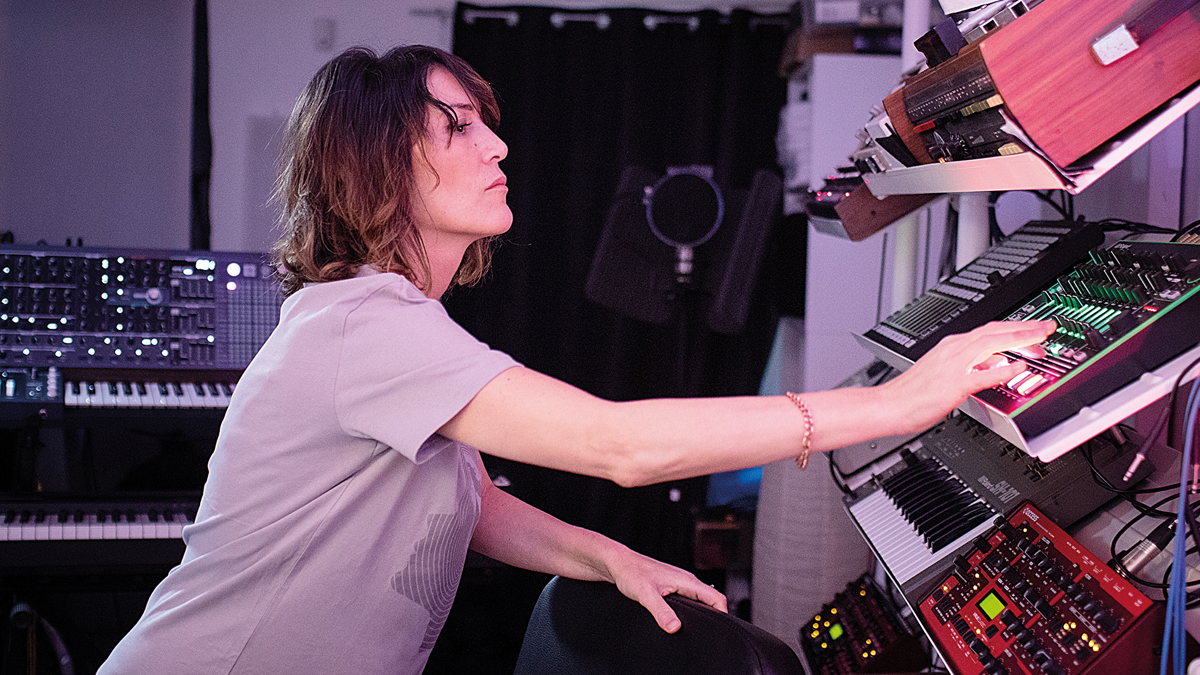
Are the strings you use on your tracks real or software generated?
“The strings are real and were recorded at different studios in London. At one studio we used an orchestra, but we also used a string quartet and another musician at a different location to get what we needed. I also used virtual instruments on some of the tracks, particularly Sylenth1.”
How do you typically approach building a track?
“It depends. Sometimes I’ll have a sound in mind, record it and build a track around that and sometimes I’ll record a vocal on my phone while I’m on tour and create a song around that when I get back into the studio. Other times I’ll start from a loop on a drum machine, so it’s rare that I’ll start any two tracks in the same way.
“When I listen to a lot of other artists’ tracks I get the feeling that the way they are made is quite similar, but none of my tracks have consistency because I always start them in a different way.”
Your vocals on the album are very strong. You studied vocal techniques formally…
“I studied at the Conservatorium of Music for piano and opera singing but didn’t finish the course as it was ten years long. When I was 18, I just wanted to move to London and in 2008 went to Thames Valley University to study vocal techniques in popular music performance. That was amazing. It was a three-year degree and we studied all different types of singing techniques for lots of different styles of music from reggae to jazz, rock and pop. We used to learn vocal techniques with other instrumentalists and have exams every Monday where we’d perform with other people. That wasn’t always ideal as I’d usually been DJing all weekend and wasn’t in great shape [laughs].”
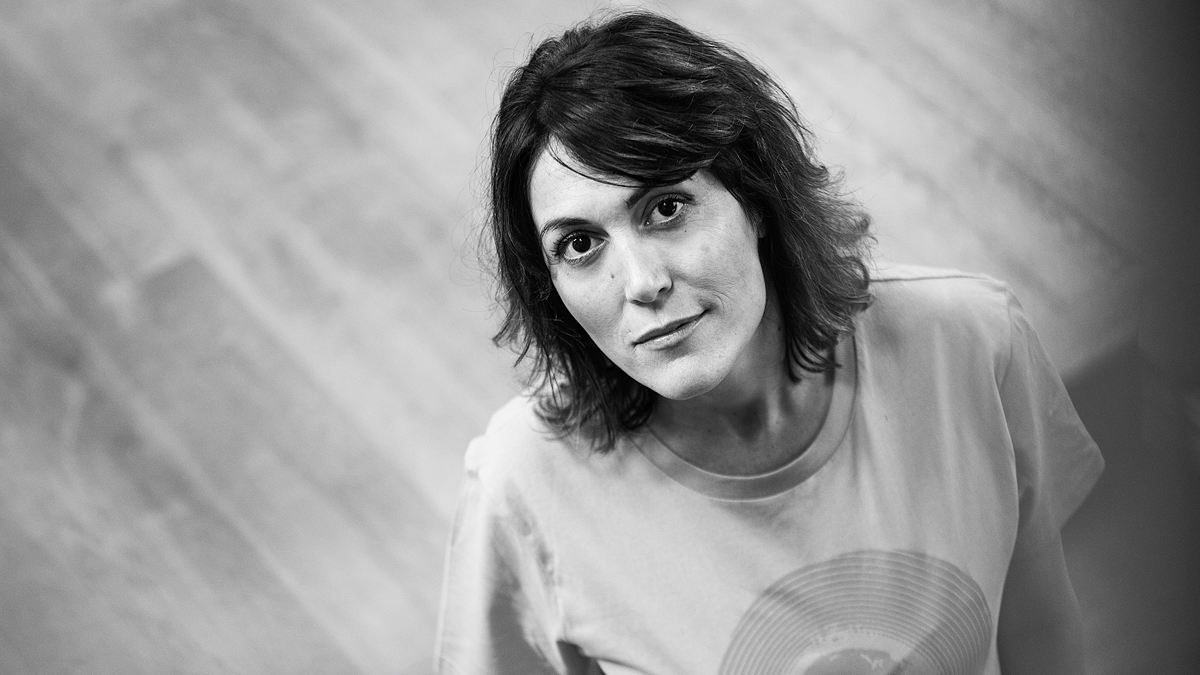
What’s your approach to recording vocals?
“I always record vocals in the studio and prefer to be alone because I feel like I need to create quite an intimate environment. The important thing is to know the sound I’m looking for and how to process the vocals - I also love using a harmoniser for vocal effects. When a track’s finished I’ll either mix it myself or use someone else depending on how difficult I’m finding it to get what I want.”
What sort of problems do you run across that require the help of a mix engineer?
“The problem with Life Of Leaf was that it was made from a combination of tracks that I’d put together over many years. On the next album, I’ll try to use the same mix engineer because although I could mix it myself it probably won’t sound as good as using a proper engineer who has all the nice equipment.
“It’s hard to find someone to mix your tracks who you really like. You really need to know what you want and be part of the whole mix process because there’s lots of back and forth and if you don’t attend the mix session they might make it sound different to how you want it.”
What mixing console are you using in the studio and how do you use it?
“It’s a Soundcraft 400B. I used to have a Mackie console but I got the 400B from Funky Junk in London about seven years ago when I used to work there.
“Soundcraft has a very vintage, raw sound - an analogue sound with a bit of noise, too. I love the console and run everything through it. I have a lot of gear and not everything fits in the room, so I’ve set up a patchbay to choose what to run through it.
“I’m quite versatile in that way. I’ll mix from ten different channels using ten different instruments and the next day swap everything up and reroute the signals. Sometimes I’ll record straight into the desk and other times into the preamp and directly into the DAW.”
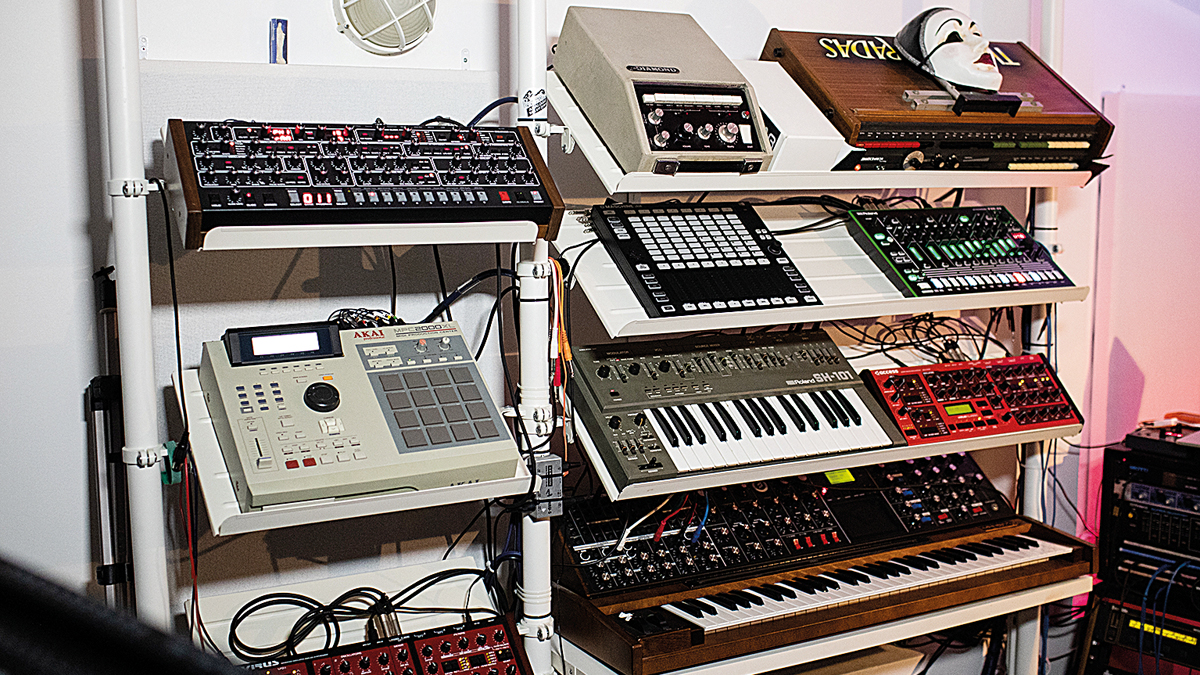
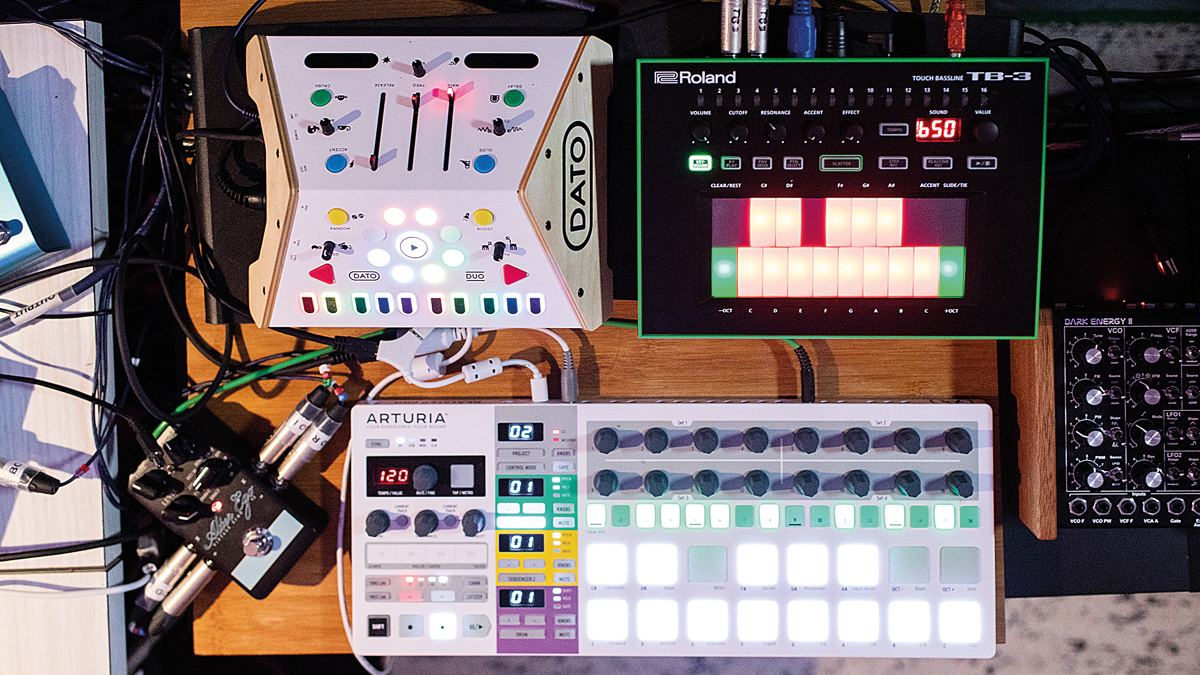
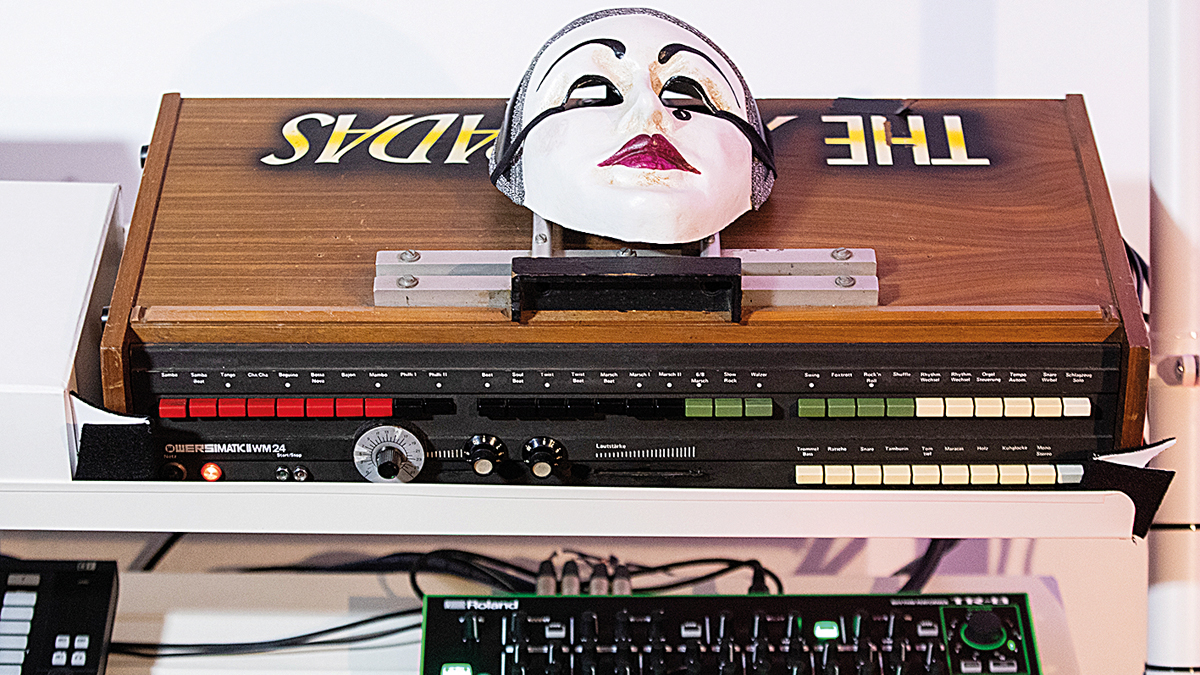
What hardware synths do you favour these days?
“I’ve got the Minimoog Voyager XL, which is great, and the Prophet 6, which I also love. I’m a big fan of the Roland SH-101 too - it makes perfect basslines for techno, but it’s really good to use for any percussion-type sound. The 101 is great when it’s controlled by a drum machine. I’m also starting to use the MatrixBrute, which is a very powerful synth.”
Do you prefer using analogue drum machines to programming in the box?
“I love the sound of analogue, although I think you can often add a nice contrast by adding soft synths. I prefer hardware because you can touch it and are obviously playing an instrument.
“On the drum machine side, I have a Tempest, a TR-08 and a JoMoX XBASE 999, which is unfortunately broken at the moment. I really miss it and it’s hard to fix drum machines. I don’t know if you’ve heard of the Wersi Drum Machine? It’s like a very old-school machine with loads of loops in it. I’ve also got a Korg Mini Pops, which is similar in style to the Wersi. Aphex Twin uses it in a lot of his tracks.”
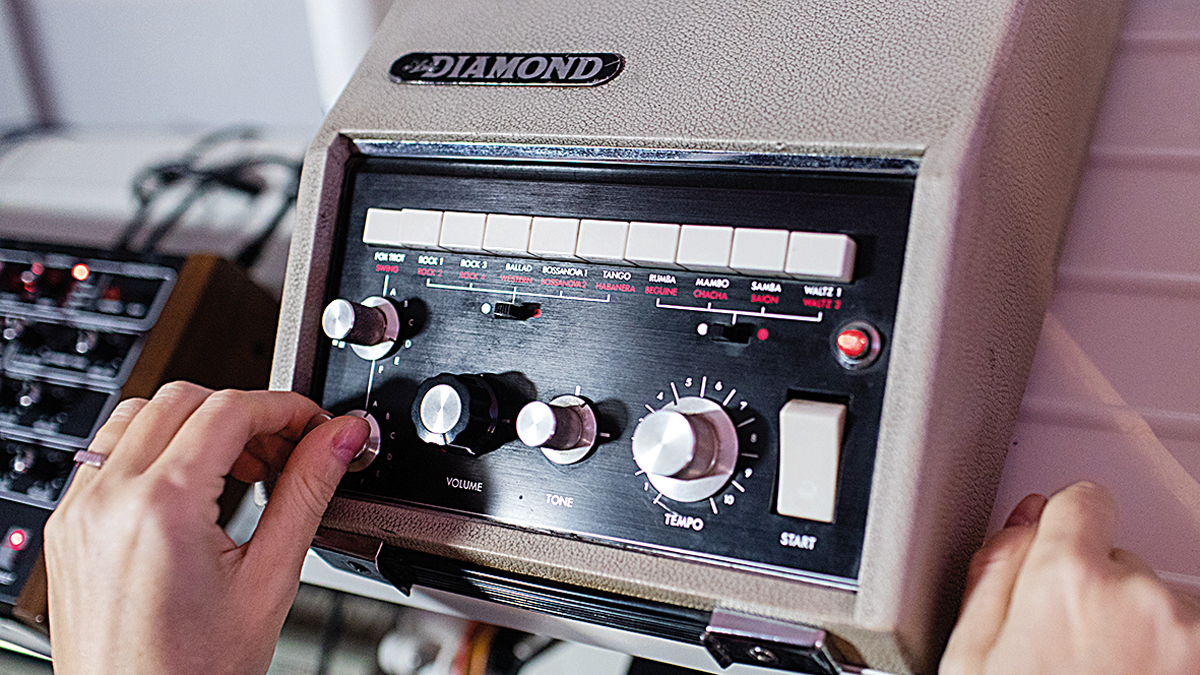
You’re still using the Akai MPC 2000?
“I wanted to have one as you can do so much with it, like sample your favourite records or even your tracks and create some super funky grooves with it. I got the white one but I’ve added ten outputs instead of the two and took out the floppy disk drive and exchanged it for an SD card. Now I can upload more sounds and it’s super-nice to use.”
We’ve read you’re a fan of the MOD Duo…
“The MOD Duo is a digital effects box and it sounds amazing. If you connect it to your computer and open the module page you can create your own line of effects by plugging a delay into a compressor or filter and creating a mono or stereo line. You can also save the effects back onto the hardware module. It’s a very strong piece of equipment that looks beautiful and it’s great to use live because you can preset all of your effects and apply them to whatever you’ve set up. For me, it’s just a different way of thinking.”
"For reverbs and delays I’ve never really found a good software plugin and prefer to use the hardware equivalent."
What are you using on the software side?
“I love Soundtoys software. I use their sounds all the time and I’m a big fan of EchoBoy and the Devil-Loc destroyer. I use Waves plugins for processing and some effects, but for reverbs and delays I’ve never really found a good software plugin and prefer to use the hardware equivalent.
“I like using the Eventide Harmoniser H3000. The amount of effects it has and its quality is unbeatable. I use it on everything and sometimes I process sounds through it and record through the desk to the DAW to give them a bit of vintage sound. I also like the Strymon Blue Sky for reverb and TC Electronic’s Alter Ego Delay pedal.”
You’re donating a percentage of your proceeds to the Life Of Releaf campaign. What’s that about?
“From the artwork to the music I feel that Life Of Leaf is very nature-oriented, so when we decided to do the album campaign I thought it’d be a really nice idea to tap into that.
“To make that connection, every time we sell a copy of the album we’re going to plant a tree. We’re working together with a company called One Tree Planted that supports global reforestation and is very well informed. The trees get planted all around the world from Australia to South America and the UK. You can choose where you want the tree to go and they always use local people to plant the right tree rather than just put some weird tree in a weird place.”
You’re preparing to perform Life Of Leaf live…
“I have plans to play live, but launching that is quite a hard thing to do. People know me as a DJ and only want to see me as that, but we have built a live set and we’re ready to go on tour. We have a very good package of remixes ready to go that feature a couple of amazing old-school acts. I’m hoping this year will be busier for me on the live stage and I’m already writing my second album so I’ll probably add those songs to the live gigs.
“On stage, I think everything will be more collaborative and the tracks will have a bit more energy.”


Future Music is the number one magazine for today's producers. Packed with technique and technology we'll help you make great new music. All-access artist interviews, in-depth gear reviews, essential production tutorials and much more. Every marvellous monthly edition features reliable reviews of the latest and greatest hardware and software technology and techniques, unparalleled advice, in-depth interviews, sensational free samples and so much more to improve the experience and outcome of your music-making.
